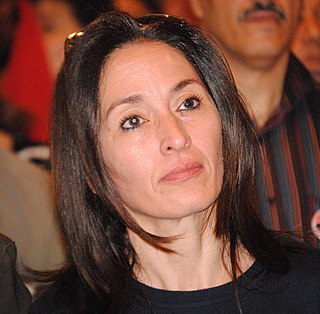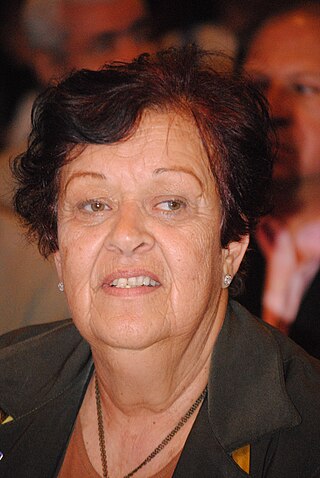
Cinema of Africa covers both the history and present of the making or screening of films on the African continent, and also refers to the persons involved in this form of audiovisual culture. It dates back to the early 20th century, when film reels were the primary cinematic technology in use. As there are more than 50 countries with audiovisual traditions, there is no one single 'African cinema'. Both historically and culturally, there are major regional differences between North African and sub-Saharan cinemas, and between the cinemas of different countries.

Hiam Abbass, also spelled Hiyam Abbas, is a Palestinian actress and film director with Israeli and French citizenship. She is known for her roles in films such as The Syrian Bride (2004), Paradise Now (2005), Free Zone (2005), Munich (2005), The Visitor (2007), Lemon Tree (2008), Insyriated (2017), and Blade Runner 2049 (2017). She gained prominence for her role as Marcia Roy in the HBO drama series Succession (2018–2023). She has also acted in the Channel 4 series The Promise (2011), the Lifetime miniseries The Red Tent (2014), the Hulu comedy series Ramy (2019–present), and the Hulu drama series The Old Man (2022).

The cinema of Senegal is a relatively small film industry which experienced its prime from the 1960s through to the early 1980s, but has since declined to less than five feature films produced in the last ten years. Senegal is the capital of African cinema and the most important place of African film production after its independence from France in 1960.

The cinema of Tunisia began in 1896, when the Lumière brothers began showing animated films in the streets of Tunis.

Sarraounia is a 1986 historical drama film written and directed by Med Hondo. It is based on a novel of the same name by Nigerien author Abdoulaye Mamani, who co-wrote the screenplay. The novel and film concern the real-life Battle of Lougou between Azna queen Sarraounia and the advancing French Colonial Forces of the Voulet-Chanoine Mission in 1899. Sarraounia was one of the few African tribal leaders that resisted the advances of French expansionists Paul Voulet and Julien Chanoine. The film won the first prize at the Panafrican Film and Television Festival of Ouagadougou (FESPACO) and was critically well received.
Muna Moto is a 1975 Cameroonian drama film written and directed by Jean-Pierre Dikongué Pipa.

Monia Chokri is a Canadian actress and filmmaker.

Nejib Belkadhi is a Tunisian actor and director.

Selma Hédia Mabrouk is a secular Tunisian politician who served on the 2011 Tunisian Constituent Assembly as a representative of Ettakatol party for the Ben Arous district. She made international headlines when she revealed that the initial draft of the constitution was attempting to define women as a "complement with the man in the family, and an associate to the man in the development of the country." The revelation was shocking to Tunisian society, where women had achieved rights unknown in the rest of the Arab world, and caused immediate outrage. Mabrouk's social media posts were instrumental in having those passages struck from the final constitution.

Leyla Bouzid, is a Tunisian screenwriter and film director.
Anissa Daoud is a Franco-Tunisian actress, author and producer. Living between Paris and Tunis, she is part of the art collective Artists Producers Associates (APA).

Taïeb Louhichi was a Tunisian film director, screenwriter, producer and filmmaker. His best known works include his debut feature film, Shadow of the Earth (1982), Layla, My Reason (1989), and La Danse Du Vent (2004).

Selma Baccar or Salma Baccar is a Tunisian filmmaker, producer and politician. She is considered the first woman to make a featured length film in Tunis. Baccar is known for creating manifestos through her films, centered around women's rights in Tunisia.

Mohamed Ben Attia, born January 5, 1976, in Tunis, is a Tunisian director and screenwriter.

Arab Blues is a 2019 French-Tunisian comedy film directed by Manele Labidi Labbé in her feature debut. It was screened in the Venice Days section at the 2019 Venice Film Festival and then in the Contemporary World Cinema section at the 2019 Toronto International Film Festival. The film is about a Tunisian psychoanalyst Selma who, after having been educated in Paris, moves back to Tunisia to open a psychoanalytic practice.
Red Satin also known as Satin Rouge is a 2002 Tunisian Arabic-language women oriented drama film written and directed by Raja Amari on her feature film directorial debut. The film stars Palestinian actress Hiam Abbass and Hend El Fahem in the lead roles. It reveals the story of a widow woman who radically transforms from a housewife to a seductive cabaret dancer. The film had its theatrical release on 24 April 2002 and opened to mixed reviews. The film received several awards and nominations at International Film Festivals.

Rim El Benna, is a Tunisian actress.
Selma Bargach is a Moroccan filmmaker.
Samia Rhaiem is a Tunisian actress.

African Federation of Film Critics is a panafricanist federation grouping African and diaspora's film critics associations, as well as individuals. It was founded in 2004 and as of 2023, the AFFC is composed of 43 associations and 456 editors. Its headquarters are in Senegal.















